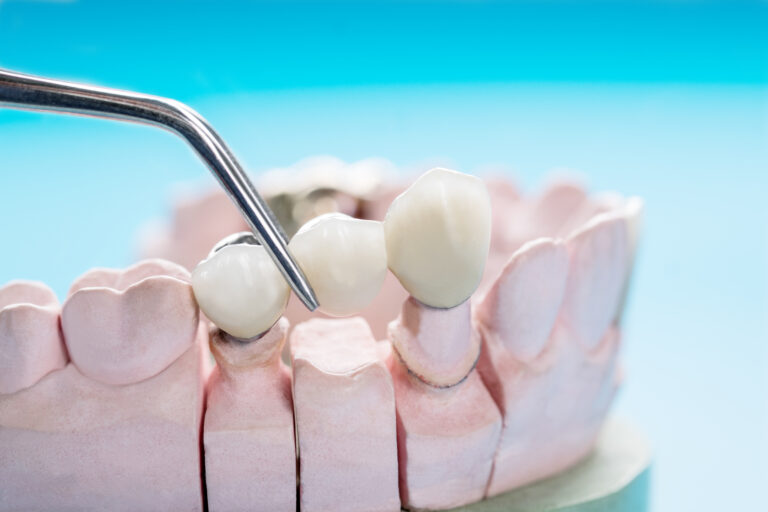Dental Crowns

Restoring and Protecting Teeth with Custom-Made Caps
Dental crowns, often referred to as caps, are versatile dental restorations designed to restore and protect severely damaged or decayed teeth. These custom-made caps cover the entire visible portion of a tooth, from the chewing surface to the gumline. Dental crowns are meticulously crafted to match the shape, color, and size of the original tooth, providing both functional and aesthetic benefits. They are commonly recommended after procedures like root canal treatment or for teeth with extensive cavities or fractures.
The Dental Crown Procedure:
- Assessment and Diagnosis: The process of receiving a dental crown typically begins with a thorough dental examination. Your dentist will assess the condition of the tooth in question, often using X-rays to evaluate the extent of damage or decay. If a crown is deemed necessary, your dentist will discuss the procedure with you.
- Treatment Planning: During the treatment planning phase, you and your dentist will make decisions about the type of crown material to be used. Crowns can be made from various materials, including porcelain, porcelain-fused-to-metal, metal alloys (such as gold), or all-ceramic materials. The choice of material depends on factors such as the tooth’s location, aesthetic preferences, and functional requirements.
- Tooth Preparation: Before a crown can be placed, the damaged or decayed portion of the tooth must be removed. This preparation ensures that the crown fits securely and functions correctly. Unlike dental fillings, which require minimal tooth reduction, dental crowns often necessitate the removal of a significant portion of the tooth’s outer structure.
- Impression Taking: After tooth preparation, an impression or mold of the tooth is taken. This impression serves as a precise model for creating the custom dental crown. In some cases, digital impressions may be used for even greater accuracy.
- Temporary Crown: While your permanent crown is being fabricated, a temporary crown is placed to protect the prepared tooth. This temporary restoration is designed to maintain tooth function and appearance until your permanent crown is ready.
- Custom Fabrication: The custom dental crown is meticulously crafted in a dental laboratory, ensuring a perfect fit and appearance. This process may take a few weeks, during which you will wear the temporary crown.
- Fitting and Bonding: Once the permanent crown is ready, your dentist will carefully fit it to your tooth to ensure an accurate match. The crown is bonded securely in place using dental cement. Any necessary adjustments are made to achieve proper occlusion (bite) and comfort.
- Finishing and Polishing: Excess material is removed, and the crown is polished to provide a smooth and natural appearance. The final result should blend seamlessly with your surrounding teeth.
Benefits of Dental Crowns:
- Restoration of Tooth Structure: Dental crowns are used to restore teeth that have been significantly damaged, decayed, or fractured.
- Strength and Durability: Crowns provide strength and stability to weakened teeth, allowing them to withstand normal biting forces.
- Custom Appearance: Crowns are custom-made to match the shape, color, and size of your natural teeth, ensuring a seamless and attractive appearance.
- Protection: Crowns protect the remaining tooth structure, reducing the risk of further damage or decay.
- Functional Restoration: Dental crowns restore the functionality of your tooth, enabling you to chew and speak comfortably.
Maintenance and Longevity:
Maintaining good oral hygiene practices, including regular brushing, flossing, and dental check-ups, is essential for the longevity of dental crowns. With proper care, crowns can last for many years, providing you with a restored and functional smile.
Dental crowns are highly effective restorations that offer both functional and aesthetic benefits. They are a valuable option for preserving and enhancing the health and appearance of severely damaged or decayed teeth. If your dentist recommends a dental crown, it’s a significant step toward restoring the strength and beauty of your smile.


